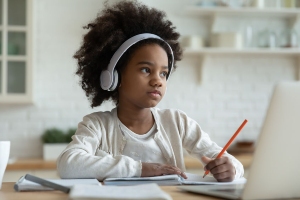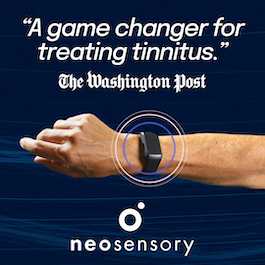|
www.HealthyHearing.com |
How do I protect my child from hearing loss due to headphones?Here's what the experts say
Contributed by Temma Ehrenfeld Q: My child uses headphones at school and at home. I'm worried this might be bad for his hearing. What can I do to help? You're right to be concerned. Frequent headphone use increases a child's risk of developing hearing loss and tinnitus. If small children use headphones, they might have trouble understanding speech in noisy places as early as their teens to early twenties, explains retired audiologist Jan Mayes, AuD. How to protect your child's hearing1. Talk to your kids about the dangers of noiseDepending on your child’s age, explain the problem: Even a volume they enjoy can damage their ears. It doesn’t have to “hurt” to be bad for them. Also, hearing loss can come suddenly. They might not have any warning. 
listening at a safe volume and taking breaks. Have a talk about what damaged hearing actually feels like. Explain that they might hear weird buzzing or ringing or other noises (tinnitus) when they’re trying to concentrate on something else—even the music they love. Tinnitus is also often accompanied by a feeling of pressure or fullness. Children sometimes think other people can hear the ringing in their ears so make sure they understand the concept. Explain that with hearing loss, it can be hard to understand what people are saying to you, and you can feel left out in groups. You might even get laughed at. Although hearing aids help enormously, but they don’t give you back exactly the hearing you had before, and they don’t usually entirely banish hyperacusis or tinnitus. 2. Set volume limits on devices. But know that kids often override the settings.You want a tween or teen to be on your side. Although a parent can set a max on the volume on both Android and iPhones, a tech-savvy child can get around them and also easily find apps online that help increase the volume even further. "Even when young, kids know how to deactivate any safe listening settings their parents might set. I sat with my kids while they set [a safe max] on their own device. We talked about how obviously they could switch them off and listen unsafely if they wanted to. It was another opportunity for us to talk about protecting their hearing health," Mayes said. 3. Aim for below 50% volumeSome headphones and earbuds advertise that they limit volume—but they don’t always deliver on that promise. Encourage your kids to keep the volume at 50 percent or lower whenever possible. 4. Encourage listening breaksTeach your children to take listening breaks. The damage from loud noise is cumulative. Even a break every hour will give the hair cells in the inner ear a rest. One strategy: A rule that they must take the headphones off if they go to the kitchen or bathroom. 5. Consider noise-cancelling headphones, rather than earbuds.This helps reduce background volume so they're less tempted to turn up the volume to mask other sounds. Teach your children NOT to turn up the volume in loud places. If they’re often using their headphones in noisy places a noise-cancelling model is essential. Don’t use headphones for sleeping overnight (napping on transit might be okay at the right volume). 6. Make sure your child gets hearing screeningsTest your child’s hearing at least every three years. Also ask your child to report any symptoms—ringing, muffling, fluttering, thumping, sensitivity, distortion, pain—even if they don’t last. Temporary symptoms mean they might return and become permanent. They should also report if they ever feel that they can’t understand what people are saying. Hearing loss already a problemAbout 1 out of every 8 kids in the US (ages 6 to 19)—and nearly 1 out of 5 of adults under 70—already have suffered permanent damage to their hearing from noise, the Centers for Disease Control and Prevention (CDC) reports. This is known as noise-induced hearing loss (NIHL), which is highly preventable. About half of the population between the ages of 12 and 35 is at risk of damaged hearing because of loud sounds, according to the World Health Organization. Headphone and earbuds play a big role in this: When researchers compared hearing exams for a large cross-section of adults in Norway at two points, 20 years apart, they confirmed that those who reported using personal music devices at high volume had worse hearing. Bottom line: It's a noisy world, and kids need help learning how to protect their hearing. Temma EhrenfeldTemma Ehrenfeld is an award-winning journalist who covers psychology and health. Her work has appeared in major newspapers, magazines and websites. You can find more of her writing at her Psychology Today blog, Open Gently. Read more about Temma. |
Featured clinics near me
Hearing Health Solutions from Ohio ENT - Columbus
974 Bethel Rd Ste B
Columbus, OH 43214
Earzlink Hearing Care - Reynoldsburg
7668 Slate Ridge Blvd
Reynoldsburg, OH 43068


Find a clinic
Need a hearing test but not sure which clinic to choose?
Call 1-877-872-7165 for help setting up a hearing test appointment.

